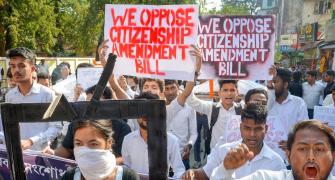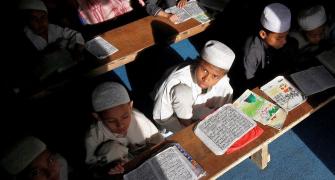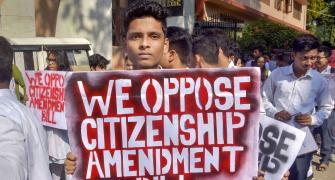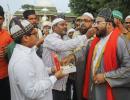The Citizenship Amendment Bill would possibly be the first piece of legislation that is perniciously discriminatory on the basis of religion/faith, notes Mohammad Sajjad.
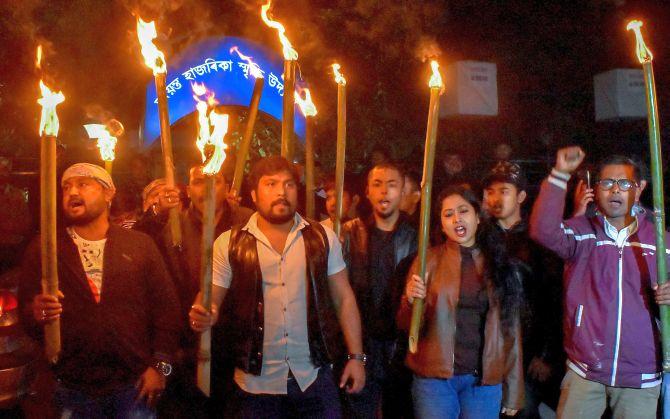
On December 4, the Union Cabinet gave its go-ahead for the Citizenship Amendment Bill (CAB) to be tabled in Parliament this week.
This would possibly be the first piece of legislation that is perniciously discriminatory on the basis of religion/faith.
This Bill violates Articles 14 and 15 of the Indian Constitution.
It would therefore be brazenly against secularism -- the basic structure of the Constitution.
This Bill comes after the National Register of Citizens exercise conducted in Assam.
The NRC has disenfranchised around 19 lakh (1.9 million) people as stateless non-citizens in Assam which was conducted under the supervision of the apex court.
Thus, even the highest judicial institution does not seem to be of any help in this politically motivated exercise of disenfranchising people of a particular faith.
There are many other instances, including the Ayodhya title verdict of November 9, 2019, which renders the hapless citizens much more vulnerable than it can really be imagined.
In a Third World country such as India where people in the highest offices are not able to produce authentic educational degrees and certificates as proof of date of birth, the common masses are forced to retrieve multiple documents pertaining to their ancestry.
This has already created a spine-chilling scare among the people in general.
Having found that the NRC exercise in Assam has turned a fairly large number of Hindus also into non-citizens, the Bharatiya Janata Party government, true to its perniciously divisive and hate-filled majoritarian ideology and praxis, is now coming out with a bill which seeks to provide citizenship only to those refugees who are not Muslims.
The Citizenship Amendment Bill (CAB) is quite consistent with the treatment meted out to Palestinians by the State of Israel with its unmistakable Zionist ideology.
It is one of the greatest ironies of human history that the incumbent Hindutva regime, which derives its ideological inspiration from the Nazism of Hitler (and fascism of Mussolini), who was the most cruel persecutor of the Jews, also remains friends with Zionist Jews, in terms of both ideology and praxis.
Given the wonderfully inclusionary nationalism of India's anti-colonial freedom struggle and its self-conscious assumption of its role as the world leader against all kinds of persecution and oppression, the Indian National Congress had come out to condemn Hitler's anti-Jewish pogrom of November 9, 1938, infamous as 'Crystal Night'.
And on December 12, 1938, the Congress went on to offer asylum to German Jews in India.
Thus, this too will go down in history as a big irony, that these persecuted Jews today appear to be with the Hindutva forces, the regressive bete noire of the Indian nationalism espoused mainly by the Indian National Congress.
The chief theoretician of Hindutva, Vinayak Damodar Savarkar (1883-1966), had already proposed such brazenly discriminatory notions of citizenship and nationhood.
Savarkar wrote his book, Hindutva, in 1917, clandestinely in the cellular jail of the Andamans, and published it underground in 1923.
Savarkar was the president of the Hindu Mahasabha during 1937-1942 while its secretary in 1926-1931 was K B Hedgewar (1889-1940), the founder of the Rashtriya Swayamsevak Sangh.
Savarkar's speech on 'India's Foreign Policy', delivered at Pune on August 1, 1938, said, '...Germany has every right to resort to Nazism and Italy to Fascism... Hitler knows better than Pandit Nehru does what suits Germany best...'
In his speech at Malegaon on October 14, 1938, Savarkar said, 'A nation is formed by a majority... what did the Jews do in Germany? They being in minority were to be driven out from Germany.'
And in a speech on December 11, 1938, Savarkar said that 'in Germany the movement of the Germans is the national movement but that of the Jews is a communal one'.
These views find echoes in a 1939 book, We, or our Nationhood Defined, by Madhav Sadashiv Golwalkar (1906-1973). He wrote, '...Muslims may stay in the country wholly subordinated to the Hindu nation claiming nothing, deserving no privileges, far less any preferential treatment, not even citizen's rights'.
All these views were endorsed and popularised in 1939 by the Marathi newspapers The Mahratta and Kesari (December 8 and 15, 1939).
From 1924 to 1935, Kesari remained immensely impressed by fascism in Italy. Savarkar, a few years before his death in 1966, also wrote a book in Marathi, Six Glorious Epochs of Indian History, wherein he justified the idea of rape of Muslim women in riots as a political tool.
B S Moonje (1872-1948), the mentor of Hedgewar, was the first Hindutva icon to have contacted the fascist regime and its dictator in Italy in March 1931. He was on a tour of Europe after the first round table conference.
Moonje, in particular, visited the fascist military training schools, and he 'played a crucial role in moulding the RSS along Italian (fascist) lines'. M R Jayakar (1873-1959), another Hindu Mahasabha leader, also 'drew inspirations from the fascist paramilitary organizations'.
The entire gamut of political Opposition is either silent or meek.
Apparently, a growing number of Hindus don't seem to be as much outraged by whatever is happening now.
If State-backed lynching is not able to rouse the people, what else really can!
For me, as a student of modern Indian history, a cause of greatest concern is: How has India become so menacing?
The colonial construct about India's past was done in a manner as to paint the Muslim rulers merely as invaders, and all Muslims responsible for whatever the Muslim rulers did in the medieval past.
Even after Independence, the historiography of Partition has been articulated and popularised mostly to vilify Muslims as mere separatists and fifth columnists.
Almost the entire guilt of Partition has been put squarely on Muslims.
This has been done even in the nationalist, liberal-secular, persuasions of historiography.
The rising majoritarianism not only of the Hindutva forces but also within the Congress, particularly from 1938 onwards, remained least known, even to the academic historians.
What then to say of the popular spaces! That this majoritarianism had no less a role in dividing India remained, and still remains, a least popularised version of Indian history.
This has further contributed to creating majoritarian hatred against Muslims.
This has gradually created a permissive and receptive atmosphere for the Hindutva ideology among a growing number of Hindus.
During the anti-Emergency movement, the 'respectable' socialists went on to provide further legitimacy to such divisive forces.
As said by Arvind Rajagopal, 'With the taint of Gandhi's assassination, the RSS was truly a political pariah.
'But after the Emergency, acquiring political power came within reach.
'The fortunes of secularism, and of Hindutva, were decisively changed thereafter'.
The RSS 'realised the significance of popular mobilisation' and later on 'fabricated an account of democratic struggle that exists mainly in its own records'.
They wear it on their sleeves and proudly call it the 'second freedom struggle'.
They had stayed away from the anti-colonial freedom struggle and had also compromised with the British.
At a meeting with Viceroy Lord Linlithgow in Bombay on October 9, 1939, Savarkar had assured him that 'the Hindu Mahasabha favoured an unambiguous undertaking of dominion status at the end of the World War II' and thus, the Mahasabha was more interested in succeeding the British with their complicity, rather than fighting them'.
Not only this, Indira Gandhi herself, after coming back to power in 1980, tilted rightward.
She accepted the invitation of the VHP's Ekat Mata Yatra (also called Ganga Jal Yatra), which was its first mass contact programme.
The Ram Janambhoomi campaign came after this yatra, and the rest is history that continues to haunt us.
Rajiv Gandhi's Assam Accord (1985) is the genesis of this citizenship precipice.
The incumbent government, continuously failing miserably on the economic front, is constantly resorting to communal polarisation.
Indians have to see through these destructive designs.
Professor Mohammad Sajjad teaches history at the Centre of Advanced Study in History, Aligarh Muslim University.

